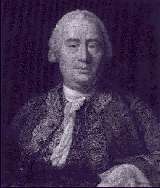
Born: May 7, 1711, in Edinburgh, Scotland
Died: August 25, 1776, in Edinburgh, Scotland
David Hume was born in Edinburgh, Scotland where he spent most of his early life. He was the second son of Joseph Hume, a member of the Scottish nobility and as young boy he took an unusual interest in philosophy.
He studied law at University of Edinburgh but did not complete his degree. He continued to study independently in France until 1737 when he began his first work La Flèche. His first major work wasn't published until 1740 when Treatise of Human Nature appeared in two volumes. Unfortunately, the work did not receive much attention at the time, although economist Adam Smith found inspiration in his writings on economics. Later, he published Essays Moral and Political which earned Hume the reputation as a great thinker and writer.
In 1744 Hume was ambitiously pursuing a prominent position in public life. After failing to obtain the position of chair of philosophy at the University of Edinburgh, he accepted a position as the tutor to the Marquis of Annandale in 1747. Later that same year, he was given the position of judge-advocate to General St. Clair which greatly increased his status and profile both internationally and at home.
Hume's next major published works were Enquiry Concerning Human Understanding in 1748 and Enquiry Concerning the Principles of Morals in 1751. The philosophy described in these works proposed that only events that could be explained rationally should be included in any system of religion. By extension, since miracles defied explanation, they could not be included in religion. It was this assertion that brought his work under considerable criticism.
Most of Hume's popularity was within the United Kingdom, and it was not until he published Political Discourses in 1752 that his fame spread to continental Europe. The attitude of skepticism in his work was consistent with much of the thought in the French intellectual community at that time which aided in his acceptance. By this time his work was being compared to other great philosophers such as George Berkeley and John Locke.
In 1763, Hume began his career in the public service. He served for two years as ambassador to Paris and was undersecretary of state from 1767 to 1768. While on his posting in Paris, he met Rousseau and the two traveled back to England. Rousseau's mental instability caused an interesting twist of events when, after a heated public disagreement, he fled back to France.
Hume retired from public life in 1769 and returned to Scotland where he died of cancer in 1776.